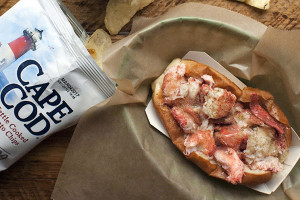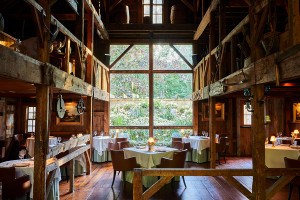Dining Out: Azure Thing
Robert Fathman is a creative, charismatic chef who has been something of a food-world cult figure, nearly—but not quite—bursting onto the scene. A motorcycle-riding, tattooed artist and rock musician raised on a farm near Cincinnati, Fathman tooled onto the Boston scene, after a few years' cooking and playing gigs in California, when he took over the large, masculine kitchens of Grill 23 & Bar. He turned out big plates of meat and fish with confident flair, and the restaurant—already a downtown fixture, now a multifloor emporium—flourished.
The place where he was supposed to have burst onto the national scene was the Federalist. But the restaurant at the plush XV Beacon hotel opened to too much publicity and too many expectations at the crest of the Internet boom, when the vastly expensive French wines in the stone-lined cellar were part of the de rigueur excess. The Fed never quite got down the formula it was aiming for, of reverent formality plus food worth the high price. Nor was Fathman's creative drive a good fit with the luxe but basically undemanding cuisine the owners needed to make that formula work. So he left, saying that 24-hour hotel food wasn't his thing.
Fathman sightings turned into a foodie sport. He had high-profile gigs in several other spots, most notably the Leather District club Trio. Fans beat a path hoping for standard dishes with an Asian twist, like tuna tartare with tamarind and citrus, or mussels in a Thai sauce with coconut milk. Fathman has the creativity of the self-taught, passionate cook, and once diners got a taste for his food—whether at the Fed or Trio—they wanted more of it.
But Fathman next went out of town, to the Red Lion Inn in Cohasset, where he spent a while cooking fish and fresh herbs with, he says, real integrity. He built up relations with local farmers. He did studio art. Then he was asked to take on another high-profile assignment: recharging the restaurant in the very central Back Bay hotel, Lenox, where Anago had recently moved out.
Azure, as the done-over space was renamed, can be a great showcase for a chef. But on the evidence of a few dinners six months after he took it over, I'm not sure this is where Fathman will finally make his mark. Neither the space nor the menu has found a clear identity that locals or visitors—and a hotel restaurant must by definition attract passers-through—can grab onto. It's easy to see exciting potential in both, with style and creative energy whirring. But it hasn't quite come into focus.
The designers have gone for dramatic spareness to emphasize the room's marvelous 10-foot Beaux Arts windows, which resemble oversize French doors and look out onto the Philip Johnson wing of the Boston Public Library—a very good view. The room feels bare, though, and impersonal. Where Anago had original paintings on the high walls, Azure has nothing; where Anago had a big open kitchen on the back wall, Azure has a shadow play of cooks and waiters behind a high wall of patterned frosted glass tiles. It's handsome and intriguing, and the dark purple velvet seats are very comfortable, but the overall effect is something like an art gallery between installations. The large service staff is young and attempts to be both welcoming and not overly intimate, as befits a restaurant where many of the entrées are over $25 and have unfamiliar ingredients whose names demand explanations. Yet the nice waitstaff's explanations, like its timing, are uncertain.
Fathman knows how to cook. When his concepts are under control and backed by good and fresh ingredients, dishes can be memorable, with astonishingly pure flavors—the combination of familiar and exotic ingredients, the mark of a chef you want to remember and follow. But often a dish has some very good and many so-so components, and the whole becomes in memory a blur.
An example of astonishing purity was the cream of sweet pea soup, a beautiful pale green that seemed the essence of fresh peas, with a floating ramekin-shaped island of subtle mushroom custard in the center and dots of sautéed fresh morels at the side. It may have been just a few smooth sips for $12, but they were heavenly sips. The “caramelized” gnocchi with braised veal breast and porcini mushroom ragu ($11) were luckily not caramelized at all, just lovely pillows in a simple and beautifully flavored meat sauce made with classical rigor.
If everything had the intense flavor and harmony of that soup and ragu, I'd go back as often as I could to Azure. But in many dishes the disparate ingredients fail to offer soothing, melding, or piquant counterpoint—the risk of artistic imagination and technical expertise without strict editing. The accompaniments to the white asparagus salad, for example, were just under control: You could taste why the salt of serrano ham, the sweet-tartness of mango, and the crunch of cashews would complement the pale perfection of a hallmark of late spring ($12). But a fat, fresh, seared scallop, mysteriously called on the menu mano de leon (a “marketing term,” the chef later admitted, for big scallops that sometimes come from Portugal but which he bought from East Coast fishermen), swung out of control, with shreds of smoked trout and sautéed shiitake slices floating lost in a celery root cream. For these prices—$15 for that smallish appetizer—the touch and balance should be surer.
Entrées were yet more unpredictable and similarly expensive. The roasted monchong ($27), a Hawaiian fish Fathman said he fell in love with in California, seemed less interesting—thick and a bit bland—than the many shark relatives East Coast chefs like to buy from the Pacific; fennel pollen, grapefruit slices, and good gingered carrot purée did little to make it more persuasive, and didn't have much to do with each other. The breaded and sautéed Casco sea dabs with a sauce of deglazed pan juices could have been fine with snap peas, ramps, and enoki mushrooms ($28), but everything got lost to the point of unidentifiability under a thick blanket of crab gratin.
Fathman's still-sure way with luxury meat and fish, something he has presumably hung on to from his Grill 23 days, showed to great effect in the duck breast roasted with a by-now-standard five-spice rub and a chervil sauce ($27), with a fine and simple accompaniment of fat Israeli couscous, peas, and porcini. The pan-roasted Scottish salmon ($28) was masterly, the skin crisp and the meat everything you hope for in rich yet distinctive flavor—and seldom get. A sweet kumquat vinaigrette didn't overwhelm it. These are entrées worth the price, with neat twists you wouldn't think of and are very glad to taste.
But the veal Oscar, an old-fashioned dish I was ready to welcome even at a hefty $34, was way too chewy. I was sorry to hear from Fathman that the veal came from an “old-school” farmer he found in Vermont; perhaps the meat isn't suited to tender scallopine. And even if diners are looking for nostalgic comfort, as he suggested, I'm not sure they're ready for breaded and fried meat with béarnaise sauce plus a thick, buttery risotto.
The desserts, by Alice Feldman, recapitulate the rest of the menu, with some spectacular flights of fancy like a German chocolate cake layered into a decorated chocolate cylinder ($9) and four little square dishes of different crème brûlées ($8). The technique is there and sometimes the flavors sing, but other times the components are disappointing on their own and mystifying together. The wines are medium priced, with good selections from both the New World and the Old.
However Azure shakes out, I've been turned into a Fathman fan. I'll keep watching him, intrigued by the creative whir and delighted when it all spins into focus.

